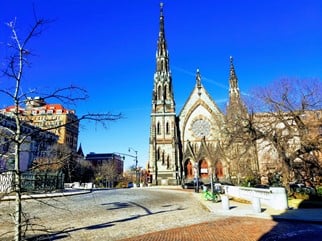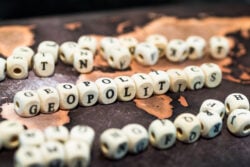In today’s issue:
- Baltimore’s commercial property crisis
- The secret passage to Pennsylvania Station
- Our least favourite coffee shop
Commercial property in Baltimore is suffering a catastrophic collapse. The Baltimore Banner:
One Charles Center sold for $4.5 million at auction
The two-day auction for One Charles Center ended Thursday afternoon with a $4.5 million purchase price, less than the $6 million the late Baltimore Orioles owner Peter Angelos paid for it in 1996. The buyer was undisclosed.
The 23-story modernist office tower, designed by famed architect Ludwig Mies van der Rohe, was built at a cost of $10.4 million in 1962 after years of downtown deterioration.
The purchase price put the value of the landmark building at $11 a square foot.
Real estate never goes down? By our estimates, Baltimore property prices have been in decline for nearly 100 years.
Old photos show the city bustling with life. Wagons, carriages… and later, cars and trucks, filled the streets. People filled the sidewalks. Smoke filled the air.
The Mount Vernon neighborhood was once one of the richest in America. It was built from wealth that was earned in manufacturing, trade, and transportation.
Railroad barons built their Gilded Age mansions here, at the railhead for the Baltimore & Ohio line, leading from the coast to the hinterlands of the continent.
Across from us is a grand place built by Robert Garrett and his wife, Mary Frick Garrett. They spent prodigiously… bought art in Europe… and brought in craftsmen who could make fabulous fireplaces and curved staircases. And they hired America’s number one architect at the time, Stanford White. It is a spectacular house, now serving as the Engineers’ Club.
Up St. Paul Street, meanwhile, is the Winans mansion, another masterpiece by Stanford White and also financed by railroad money. It was built by Ross Winans, whose father had made his fortune by building railroads in Russia!
We had our own office in the building for many years, with our desk placed in front of a huge, beautifully painted safe, meant to warehouse the Winans’ fortune. Money was real back then; Winans needed a big safe to keep it.
It was said that there was a secret tunnel that linked the house to the nearby Pennsylvania Station, so that Mr. Winans could make a quick retreat if necessary. We searched the basement; we never found it.
But in Baltimore today, there is little trace of that upward striving energy and dynamism that built the city. The urban streets seem almost derelict… shabby… and, well, funky.
The area enjoyed a bit of defibrillation last week. It was the 200th anniversary of Lafayette’s triumphal 1824 tour of America. The young Frenchman had famously helped the revolutionaries during their war with England. He brought money… soldiers… and ships to aid the cause of liberty and helped them win the decisive battle of Yorktown, Virginia.
“There were actually more Frenchmen fighting the British at Yorktown than there were Americans,” explained the French colonel who had been sent by the embassy for the event.
In 1776, most Americans were either indifferent to the ‘Revolutionary War’ or opposed to it. Only a third supported it. But when a war is won, ‘patriots’ multiply like maggots, feeding on the dead flesh of victory. And by 1924, Baltimore had erected a marvelous statue of Gilbert de Motier, the marquis de Lafayette. This year, their pride expanded even further as they noted that Lafayette was taught English by an ‘African-American woman!’
A crowd gathered at the monument. Bands played the Marseillaise and the National Anthem… a man dressed as Lafayette had his photo taken with our grandchildren… and then our group adjourned to a local club for strong drink and weak speeches.
Then, on Sunday, we took a walk … surveying the many architectural treasures… almost all relics of the 19th or early 20th centuries. The handsome houses had cornices, porticos, hanging bay windows, curved glass and columns.
In a coffee shop, two Black women stood at the counter, placing an order. One had long blue tresses in her hair… the other had ones of gold.
On a bench nearby, a young man talked to himself. He did not seem angry… but animated, as if deep in an intense discussion with someone who is not there.
It was a Sunday morning in Baltimore. ‘Rainbow’ flags hang from some windows. Black Lives Matter flags are out too.
A woman with a blue mohawk passed, walking her dog. Two chunky women in work overalls… both with short hair… strolled on the other side of the street holding hands.
Charles street runs north to south, right through the heart of the city. It was once the most elegant street in an elegant and prosperous city. But on Sunday, you could have taken a nap in the middle of the street without much risk of injury. The occasional motorist would have taken you for another of the many drug addicts and drunks who, on Sunday morning, sleep it off on the sidewalks and in entryways… one was on the steps of the grand Methodist church, now de-consecrated and empty, on Mt. Vernon Place.
The deconsecrated Methodist Church on Mount Vernon Square
Two large-ish young women… in small-ish, tight dresses, suddenly came tumbling out of a night club… holding onto each other… giggling. A big, black station wagon picked them up.
A huge man with a huge beard sat in a huge pick-up truck. ‘Bay State Pipelines’ it said. He was drinking coffee, before going back to tearing up the street.
The city has gone to the dogs. Literally. A fat 20-something woman walked through the park… with a tiny dog on a leash. A thin young man tugged on a pit-bull in a choke collar. There are small dogs. And big dogs. Collies. Terriers. Sheep dogs. And spindly greyhounds. Everyone seems to have a dog. Even the homeless and shiftless have dogs. They appear to use them as props, friends, or maybe just pets.
On the sidewalk, a middle-aged Black woman with dyed yellow hair sat with her dog… and a caddy full of her belongings. A ‘bag lady,’ she had a cup in front of her for donations. She smiled into space, but said nothing.
The only businesses that are open on Sunday are the cafes. Each seems to have its own brand… and own clientele. One is the hangout for gays, bis, polyamorous, thrupples… or whatever. The staff are tattooed and pierced. The customers too. Many have dogs with them that are sometimes tied to railings outside.
The servers all seem to have an attitude. They are not meant to be working there, they seem to be saying. They are artists, musicians, activists and revolutionaries – all manques. In their spare time they are composing soundless music. In their drawers they have unpublished novels. But they need a ‘day job’ to support themselves. And this is it. But don’t get the wrong idea; they are not there to ‘serve’ the customer… but just to go through the motions until quitting time.
‘Normal’ people — retired tourists… or students from one of the nearby schools — might be put off by the gay joint. Down the street, another coffee shop puts them at ease. It is run more professionally by a Lebanese fellow. At least, we think he is Lebanese. We don’t know. But his ship is tight… and his cabin crew are not just privileged White dropouts, but Hispanics and Blacks who actually seem to take their jobs seriously. They are polite. And they know how to make a good cup of coffee.
But among the customers there are still quite a few people who look like they might have been extras in a John Waters movie. Old people shuffle in, struggling to stay on the right side of dementia. And there are young people — often students at the nearby ‘arts’ school — who are wondering if they should switch majors, switch schools, or switch sexes.
Two other coffee shops are worth a mention. One of them seems to have gotten the young professional crowd. It is new, hip, cool… with all the oat-milk and gluten-free pastries you could want. You go in… and you see dozens of people with their laptops open. Some are probably students at the medical school. Some might be students at the law school. And some are perhaps already employed… on-line and on-the-job in the relative camaraderie of a well-lit coffee shop rather than at home, where they pay the electric bills themselves.
The final coffee shop in our small area is our least favourite. Its servers are supercilious, rule-following, self-absorbed numbskulls.
Here’s what happened. When we finally returned from Argentina, at the tail end of the lockdown in 2020, we stopped there for a coffee. The front door was closed. “No entry during pandemic,” it said… or something like that. Instead, it had a window open to the street, “Place order here” said the sign. So, we did as instructed.
“I’d like a cappuccino,” we said to a pimply post-teen, with straight dark hair, shaved on both sides of his head but let to grow long on top.
“You have to place your order online,” was the monotone reply.
“Well, I don’t have my phone with me.”
“Sorry, you have to place the order online.”
“Uh… I’m standing right here. I’m your only customer. Why don’t I just give you $4… and you give me a cup of coffee? It’ll be our little secret.”
“You have to place your order online,” came the robot-like answer.
We haven’t been back.
Regards,
![]()
Bill Bonner
Contributing Editor, Fortune & Freedom



